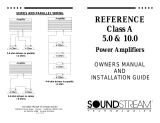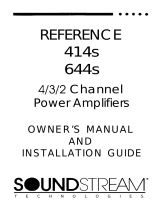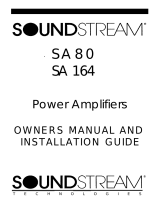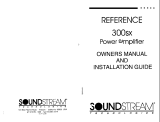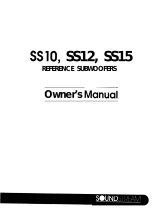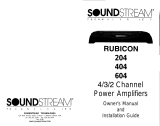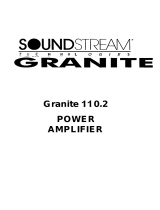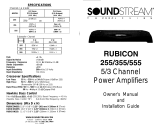Page is loading ...

1
REFERENCE
705s
5/3 Channel
Power Amplifier
OWNERS MANUAL AND
INSTALLATION GUIDE

2
CONGRATULATIONS!
You now own the REFERENCE705s Amplifier, the product of an uncompromising design
and engineering philosophy. Your Soundstream REFERENCE amplifier will outperform any
other amplifier in the world.
To maximize the performance of your system, we recommend that you thoroughly acquaint
yourself with its capabilities and features. Please retain this manual and your sales and
installation receipts for future reference.
Soundstream amplifiers are the result of American craftsmanship and the highest quality
control standards, and when properly installed, will provide you with many years of listening
pleasure. Should your amplifier ever need service or replacement due to theft, please record
the following information, which will help protect your investment.
Serial # _____________________________________________
Dealer’s Name _______________________________________
Date of Purchase _____________________________________
Installation Shop ______________________________________
Installation Date ______________________________________
CAUTION!
Prolonged listening at high levels may result in hearing loss. Even
though your new Soundstream Reference705s sounds better than
anything you’ve ever heard, exercise caution to prevent hearing damage.

3
TABLE OF CONTENTS
Features ..............................................................................................................4 - 5
REFERENCE705s Diagram ................................................................................6 - 7
REFERENCE Power Supply Design ........................................................................ 8
Setting High Power/High Current ............................................................................. 9
Selecting Crossover Modes .................................................................................... 10
Selecting Input Modes ............................................................................................ 11
Setting Coherent Stereo/Bridged Mono .................................................................. 12
Wiring (with Diagram) ......................................................................................12 - 13
Installation and Mounting ....................................................................................... 14
Level Setting ........................................................................................................... 15
Crossover Adjustments ........................................................................................... 16
AIRBASS™ ............................................................................................................ 16
LSE.Q Subwoofer Equalization Circuitry ................................................................ 17
Sample Systems ..............................................................................................18 - 21
Protection Circuitry & Troubleshooting ................................................................... 22
Service .................................................................................................................... 23
Specifications ......................................................................................................... 23

4
DESIGN FEATURES
• Uncompromising Design and Construction including mil-spec glass epoxy circuit boards
and high current custom gold-plated solid brass connections that will accept up to 4 gauge
power/ground wire.
• High Power/High Current Capability (subwoofer channel only) - Soundstream’s exclusive
circuitry permits customization of your amplifier to its particular application—High Current, for
ultra-low impedance loads (multiple subwoofers, less than 1 ohm) or High Power, for higher
impedance loads (1 ohm and up).
• Chassisink
TM
Darlington Power Array - Soundstream’s “overbuilding” of the output section
incorporates multiple output transistors instead of a few for faster, stronger power delivery.
The transistors are directly sandwiched between the circuit board and the heatsink in a
design called Chassisink
TM
to ensure cool, efficient amplifier operation.
• Staggered Asymmetrical Electronic Crossover - Continuously variable 2 or 3-way
crossovers with 12 dB/octave high pass and 24 dB/octave subwoofer low pass. In 3-way
mode, bandpass can be selected for midrange or midbass.
• Rear Channel De-emphasis - A circuit based on theater surround technology in which rear
fill information is rolled off at 6 dB/octave with a -3 dB point at 7,000 Hz to provide a more
realistic listening experience (in 5 channel mode only).
• PowerGrid Power Supply Design - All power supply components are located near one
another, for the shortest possible current path and are connected by thick, wide PCB traces,
which ensures rapid, high current delivery. The entire power supply is isolated on one side
of the circuit board while the audio stage is located opposite it, guaranteeing minimal noise.
• Ultra-Low ESR Capacitance Bank - 24 miniature “stiffening” capacitors ensure rapid power
delivery for dynamic peaks. Multiple small input power capacitors are used to provide a
lower ESR (Equivalent Series Resistance), which means more power, faster.
• Smart Thermal Rollback - Most amplifiers shut off when they get too hot. In the unlikely
event the Reference705s reaches 85° C, it will gradually roll back its average power (without
affecting the dynamics). Once the amplifier has cooled off, it returns to full power output. If
overheating should continue, a second thermal sensing protection circuit will shut off the
amplifier if the heatsink reaches 95° C.
• Unregulated Power Supply - 4 ohm power ratings are measured at 12 volts, which means
substantially greater output in the real world when the vehicle is running, where voltages
range from 13.6 to 14.4 volts. Dynamic capability of the unregulated power supply is vastly
greater than that of a tightly regulated power supply.
• Fault Monitor LED on the front panel notifies you of a blown power supply fuse.
• 1/2 Ohm Subwoofer Drive Ability - The Reference705s' subwoofer channel is designed to

5
be stable into any impedance, down to 1/2 ohm.
• Six Dual Discrete Class A Drive Stages - Over six times the drive current of most amps,
which guarantees maximum performance into any load.
• Drive Delay
TM
Muted Turn-on/off Circuit - A unique circuit which completely eliminates
amplifier-related turn-on/off noises.
• Flexible Input Sensitivity accepts voltages from 200 mV (80 mV on the subwoofer channel)
to 5.0 V, which permits maximum output from the amplifier with virtually any source unit.
• Balanced Input Design for added immunity to noise caused by component and vehicle
electrical system interaction.
• AIRBASS™ Upgradable - This feature allows RF wireless remote control level adjustment of

6
Reference705s

7
Key to Callouts
1. Fault LED - Indicates a blown fuse.
2. High Power LED - Indicates amplifier power on in "High Power" mode.
3. High Current LED - Indicates amplifier power on in "High Current" mode.
4. Main Fuse - Main power supply fuse.
5. +12V - Connected to a fuse or circuit breaker, then to the battery's positive post.
6. GND - Main ground connection. Bolt to a clean chassis ground in the vehicle.
7. REM - Remote turn-on input from the head unit. Accepts +12V.
8. Speaker Output Connections - Mono subwoofer channel.
9. LSE.Q - Frequency and Q adjustments.
10. Low Pass Crossover Adjustment Pot - Subwoofer channel; crossover frequency setting for the internal low
pass filter.
11. Input Level - Subwoofer channel level control.
12. Inputs - Right and left channel RCA inputs for the subwoofer channel.
13. Speaker Output Connections - Channels 1 & 2.
14. Crossover Adjustment Pots - Channels 1 & 2 crossover frequency setting for the internal high pass filter in
2-way mode, and channels 1 & 2 and 3 & 4 crossover frequency setting for the internal band pass filter in 3-
way mode.
15. Input Level - Channels 1 & 2 level control.
16. Inputs - Right and left channel RCA inputs for channels 1 & 2.
17. Speaker Output Connections - Channel 3 & 4.
18. High Pass Crossover Adjustment Pot - Channels 3 & 4 crossover frequency setting for the internal high
pass filter in 2-way mode.
19. Input Level - Channels 3 & 4 level control.
20. Inputs - Right and left channel RCA inputs for channels 3 & 4.
21. Subwoofer Channel Crossover Switch - Select LOW PASS for use with the internal crossover, or BYPASS
for use with an external crossover.
22. Subwoofer Channel Input Select - Selectable inputs from internal (from channels 1 - 4) or external (from
Subwoofer local RCA inputs).
23. Coherent Stereo™/Bridge Mono Switch - Channels 1 & 2; Select "Bridge" for bridged mono operation (use
right channel input). Select "Stereo" for coherent stereo operation.
24. Channels 1 & 2 and 3 & 4 Bandpass Range Crossover Switch - 3-way operation only; Select "MID" for
use with midrange drivers and tweeters, or "MIDBASS" for use with midbass drivers and satellites.
25. 2-way / 3-way Crossover Switch - Channels 1 & 2; Select 2-way for high pass / low pass operation, or 3-
way for highpass / bandpass / lowpass operation.
26. Channels 1 & 2 Crossover Switch - Select "HIGH PASS" for use with the internal crossover, or "FULL
RANGE" for use with an external crossover.
27. Coherent Stereo™/Bridge Mono Switch - Channels 3 & 4; Select "Bridge" for bridged mono operation (use
right channel input). Select "Stereo" for coherent stereo operation.
28. 2-way / 3-way Crossover Switch - Channels 3 & 4; Select 2-way for high pass / low pass operation, or 3-
way for highpass / bandpass / lowpass operation.
29. Channels 3 & 4 Crossover Switch - Select "HIGH PASS" for use with the internal crossover, or "FULL
RANGE" for use with an external crossover in 2-way mode.
30. Channels 3 & 4 Input Select - Selectable inputs from internal (from channels 1 & 2) or external (from
channel 3 & 4 local RCA inputs) in 2-way mode.
31. Rear Fill De-emphasis Switch - Channels 3 & 4; Select "ON" to engage the 6 dB/octave low pass filter at 7
kHz for use in 5-channel / 2-way mode.
32. High Power / High Current Switch - Subwoofer channel only.

8
4 Ohm Sub Channel Watts
12 volts
14.4 volts
0 50 100 150 200 250
REFERENCE POWER SUPPLY DESIGN
The Reference705s employs an extremely efficient unregulated pulse-width modulated
power supply. Like the rest of the REFERENCE amplifiers from Soundstream, the
Reference705s is rated at 12 volts but is designed to take advantage of the additional
voltage available when the vehicle is running. The two major advantages of the unregulated
power supply are:
• awesome dynamic power capabilities
• added continuous power with higher voltages (see chart below)
Because of the dynamic properties of most music, all audio components should be able to
react accordingly. Thanks to its unregulated power supply, the Reference705s can
4 ohm Power
200 watts x 1 @ 12 volts
Read this, or sparks will fly!
The Soundstream REFERENCE705s amplifier has extensive internal power supply capacitance, called the Ultra-
Low ESR Capacitance Bank. Multiple small input power capacitors act as an internal "stiffening capacitor".
Because of the large amount of internal capacitance, there may be a sizable spark when connecting the power
and ground lead to the amplifier for the first time. In order to charge the capacitor bank without a spark, we
suggest you do the following:
1. Connect the +12 volt cable to the amplifier and to the battery.
2. Connect one end of the ground cable to the chassis of the vehicle.
3. We have supplied a 150 ohm, 2 watt resistor with the amplifier. One leg of the resistor has been connected
to the ground terminal of the amplifier.
4. To charge the capacitor bank, touch the loose end of the ground cable to the open leg of the resistor for at
least 45 seconds.
5. Remove the resistor, and connect the ground wire.

9
INSTALLATION STEP 1
SETTING THE
HIGH POWER/HIGH CURRENT SWITCH
(applies to subwoofer channel only)
The Reference705s’ subwoofer channel can be switched between “High Power” and “High
Current” modes. This allows the Reference705s to maximize power and efficiency at
impedances ≥1 Ohm in “High Power” mode, or down to 1/2 Ohm in “High Current” mode.
The circuit operates by selecting a set of power supply voltage rails best suited to your
particular application. One is a higher voltage “tap” optimized for high impedance
applications while the other is lower voltage designed to provide more current. Unlike other
amplifiers, Soundstream’s REFERENCE amplifiers can be configured to drive virtually any
impedance and make maximum power!
To determine the setting for your application, follow the chart below:
4 Ω
12 Volts
2 ΩΩ
14.4 Volts
1 Ω
14.4 Volts
1/2 Ω
14.4 Volts
High Power
Watts
200
300 400 n/a
High Current
Watts
100 200 300 400
OTHER COMMENTS:
If you blow fuses with your Reference705s, switch to the High Current
mode. If the problem persists, it is likely that the amplifier is seeing a
dead short, either in the speaker wire or in the speaker itself. Rectify

10
SELECTING THE CROSSOVER MODES
The Reference705s incorporates a sophisticated, fully adjustable electronic crossover for each of its
two pairs of channels and subwoofer channel. The Reference705s can drive a full system without
need of an outboard electronic crossover.
Before installing the amplifier, make certain the switches on the bottom are set to the correct positions.
After setting the switches, be sure to install the hole plugs included with the amplifier.
LOW PASS
The subwoofer channel is designed to operate in low pass or full range. The low pass is a
continuously variable 24 dB/octave electronic crossover with a range of 30 - 120 Hz.
2-WAY
HIGH PASS
The high pass crossover is used for sending only midrange and high frequency information to
particular speakers. Activate the high pass crossover to drive satellite or coaxial speakers in the
system along with subwoofers. You can later adjust the exact frequency from the front of the
amplifier. The high pass frequency can be adjusted separately for either pair of channels of the
amplifier.
REAR FILL DE-EMPHASIS
The Reference705s features an innovative rear fill de-emphasis circuit which places more
emphasis on the front stage when used in the five channel mode. The circuit removes frequencies
above 7,000 Hz at the rate of 6 dB/octave. By removing upper frequency information from the rear
fill, a more natural sounding rear fill effect is created.
3-WAY
MIDBASS/MIDRANGE BAND PASS
The Reference705s can be operated in midrange or midbass “band pass” configuration. In the 3-
way mode, you can tri-amplify with “active” midbass or midrange to maximize control over
individual drivers. The bandpass includes a low pass and a high pass filter, which work
independently of one another, to drive the midrange or midbass speakers. In 3-way crossover
mode, channels 1 & 2 become HIGH PASS, and channels 3 & 4 become BANDPASS. (NOTE: In
3-way mode, channels 3 & 4 inputs are not used.)
INSTALLATION STEP 2

11
SELECTING INPUT MODES
The Reference705s can be driven with either one, two, or three pairs of stereo inputs. If your
source unit has front and rear outputs, you can take advantage of its fading capability by
driving the Reference705s in 5 channel mode with two pairs of inputs. When operated in the 5
channel mode with 2 pairs of inputs, the lowpass subwoofer channel will operate in a non-
fading mode—it derives its signal from the front and rear inputs. After setting the input mode
switches, be sure to install the hole plugs included with the amplifier.
5 CHANNEL OPERATION WITH 4 CHANNELS OF INPUT
• Front input to Channels 1 & 2 and set stereo switch to either “Coherent Stereo” or “Mixed-Mono”
• Rear input to Channels 3 & 4 and set input switch to “3 & 4”; stereo switch to either “Coherent
Stereo” or “Mixed-Mono”
• Subwoofer input switch set to “CH 1 - 4”
5 CHANNEL OPERATION WITH 2 CHANNELS OF INPUT
• Input to Channels 1 & 2; set stereo switch to either “Coherent Stereo” or “Mixed-Mono”
• Channels 3 & 4: set input switch to “Internal From Ch 1 & 2”; stereo switch to either “Coherent
Stereo” or “Mixed-Mono”
• Subwoofer input switch set to “CH 1 - 4”
3 CHANNEL OPERATION WITH 2 CHANNELS OF INPUT
• Input to Channels 1 & 2: set stereo switch to “Mono”
• Input to Channels 3 & 4: set input switch to “3 & 4”; stereo switch to “Mono”
• Subwoofer input switch set to “CH 1 - 4”
INSTALLATION STEP 3

12
INSTALLATION STEP 5
WIRING
POWER AND GROUND
To assure maximum output from the Reference705s, use high quality, low-loss power and
ground cables. The Reference705s will accept up to 4 gauge power and ground cables, which
is the only size recommended.
For system
examples and
diagrams, see pages
18 - 21.
COHERENT STEREO™ / BRIDGED MONO
The stereo channels of the Reference705s have the ability to operate in either of the following
modes:
Coherent Stereo with identical left and right stereo channels for maximum fidelity.
Bridged Mono for dedicated single channel operation; ideal for using the Reference705s in 3-
channel operation. It is also used when large amounts of power are necessary for single
speakers. In bridged mono, only the right channel input (per pair of channels) is active.
INSTALLATION STEP 4
In bridged mono, only the right channel
input is active.
Read this, or sparks will fly!
The Soundstream REFERENCE amplifiers have extensive internal power supply capacitance, called
the Ultra-Low ESR Capacitance Bank. Multiple small input power capacitors act as an internal
"stiffening capacitor". Because of the large amount of internal capacitance, there may be a sizable
spark when connecting the power and ground lead to the amplifier for the first time. In order to charge
the capacitor bank without a spark, we suggest you do the following:
1. Connect the +12 volt cable to the amplifier and to the battery.
2. Connect one end of the ground cable to the chassis of the vehicle.
3. We have supplied a 150 ohm, 2 watt resistor with the amplifier. One leg of the resistor has been
connected to the ground terminal of the amplifier.
4. To charge the capacitor bank, touch the loose end of the ground cable to the open leg of the
resistor for at least 45 seconds.
5. Remove the resistor, and connect the ground wire.

13
WIRING DIAGRAM
WIRING (continued)
CIRCUIT BREAKERS/FUSES
EXTERNAL
Like all car audio amplifiers, the Reference705s must be protected with a fuse or circuit
breaker located within 18” of the battery. This will prevent a fire in the event of a shorted
cable. The value of the circuit breaker or fuse should be between 60 and 80 amps.
INTERNAL
The Reference705s is fused on its front panel with a 40 amp Maxi-fuse. In the event of a
blown power supply fuse, the “Fault” indicator on the front panel will light. Never replace
the fuse with a higher value than what is supplied. This may result in amplifier
damage and will void the warranty!
REMOTE TURN-ON
Connect the turn-on lead from the source unit to the “Remote” input on the amplifier. When
+12 volts is received, the amplifier will turn on.
SIGNAL CABLE
Depending on your application, you may use one to three pairs of signal cables to drive your
Reference705s. Use a high-quality cable that will be easy to install and has minimal signal
loss to guarantee optimum performance.
SPEAKER CABLE
The Reference705s will accept up to 8 gauge speaker cable. Use a high quality, flexible,
multi-strand cable for best performance and longevity. Soundstream Speaker120 (12 gauge)

14
INSTALLATION AND MOUNTING
1. AMPLIFIER LOCATION
The Reference705s employs highly efficient circuitry and Soundstream's unique Chassisink
TM
design to maintain lower operating temperatures. Additional cooling may be required if the amplifier
is located in an area with poor air flow, or when driving especially low impedance loads at extremely
high levels.
When mounting the amplifier, it should be securely mounted to either a panel in the vehicle or an
amp board or rack that is securely mounted to the vehicle. The mounting location should be either
in the passenger compartment or in the trunk of the vehicle, away from moisture, stray or moving
objects, and major electrical components. To provide adequate ventilation, mount the amplifier so
that there are at least two inches of freely circulating air above and to the sides of it.
2. MODE SWITCHES
Set High Power/High Current, Input Switches, and Crossover switches to the appropriate positions
(see pages 9 - 11 and 18 - 21). These switches determine the design of the system!
3. MOUNTING THE AMPLIFIER
a. Using the amplifier as a template, mark the mounting surface.
b. Remove the amplifier and drill the holes.
c. Mount the amplifier to the surface using the provided hardware.
4. WIRING
a. Run and connect the audio signal and remote turn-on cables to the amplifier from the source
unit.
b. Carefully run the positive cable from the amplifier to a fuse or circuit breaker within 18” of
the battery.
c. Then connect the fuse or circuit breaker to the battery. Leave the circuit breaker off or the fuse
out until everything is bolted down.
d. Secure the ground cable to a solid chassis ground on the vehicle. It may be necessary to sand
paint down to raw metal for a good connection.
e. Double check each and every connection!
f. Re-connect the fuse or circuit breaker.
5. POWER UP
Power up the system and look at the top of the amplifier. Depending on the subwoofer
INSTALLATION STEP 6
Your Reference705s is provided with #8 sheet metal screws which use a 1/8” drill hole.
NOTE: There may be a sizable spark when connecting the power and ground lead to the amplifier for
the first time. Please see the comment on the previous page for information about connecting power
and ground wires to your amplifier. Please see the comment on page 12.

15
INSTALLATION STEP 7
LEVEL SETTING
The input levels are adjusted by means of the input level controls located on the front of the
amplifier. This is a unique dual-stage circuit that adjusts both level and gain. This topology
maintains better Signal to Noise ratios even with low output sources.
In the ideal situation, all components in the audio system reach maximum undistorted output at
the same time. The reason is because an amplifier will only make what comes into it bigger.
So, if you send it a distorted signal from the head unit, it is going to amplify distorted
information. The same thing holds true if an outboard processor or crossover begins to distort
before you have maximum output from the amplifier. By setting all components to reach
clipping at the same time, you can maximize the output of your system. For the
Reference705s, follow the below procedure for the quickest, easiest means of setting the
levels.
1. Turn the amplifier's input levels to minimum position (fully counter-clockwise).
2. Set source unit volume to approximately 3/4 of full volume.
3. While playing dynamic source material, slowly increase the amplifier’s input level until a
near maximum undistorted level is heard in the system.
NOTE: Your best combination of output and Signal to Noise ratio will
be achieved when the input levels are set between 500 mV and 5.0 V.

16
CROSSOVER ADJUSTMENTS
In most car audio installations, there is a tendency for a “midbass boom.” Because of their interior
dimensions, most cars will resonate or ring at these midbass frequencies. If we design the system so
there is less musical information in this region, the final response is very smooth and natural sounding.
The Reference705s incorporates a continuously variable staggered asymmetrical electronic crossover.
The high and low pass portions of the crossover can be adjusted independently of one another.
Follow the procedure below to adjust the crossover.
Staggered Asymmetrical
Crossover
24 dB/octave low pass,
12 dB/octave high pass
12 dB/octave band pass
NOTE: You may find it necessary to readjust the crossover after listening to the system. The correct
settings are a combination of the capabilities of the equipment and your listening preferences.
INSTALLATION STEP 8
1.With the crossover activated, set the frequency adjustments to the 12 o’clock position.
2.While listening to music, adjust the high pass frequency control. Select a frequency high
enough to prevent damage to the speakers, yet low enough that you are able to retain
midbass in the front speakers.
3.Adjust the low pass frequency control in the same way as the high pass. This time, listen
to the bass. You should find a setting that will give you a solid sound with minimum “boom”
from resonating frequencies.
24 dB/Oct. Low Pass
12 dB/Oct. High Pass
12 dB/Oct. Band Pass
AIRBASS™ ACCESSORY OPTION
Soundstream's new AIRBASS™ feature can be added to the REFERENCE705s amplifier. This
feature allows wireless RF remote control level adjustment of the REFERENCE705s' subwoofer
NOTE: The AIRBASS™ accessory operates the subwoofer channel only.
AIRBASS™ does not control the level of channels 1,2,3 & 4.
Installing AIRBASS™ involves removing the bottom plate of the amplifier, adding the AIRBASS™
circuit board, and flipping a switch. The switch is labeled on the amplifier's main circuit board. DO
NOT set the AIRBASS™ switch to the "IN" position unless the AIRBASS™ module has been added.
DO NOT move the AIRBASS™ switch while the amplifier is "ON". Doing so may damage your
speakers. (Please refer to the AIRBASS™ owner's / installation manual for more details.)

17
INSTALLATION STEP 9
LSE.Q
THEORY AND USE
LSE.Q is a proprietary subwoofer control circuit included with the Reference705s
amplifier. It is capable of both removing subsonic energy in program material and
providing a variable boost at low frequencies. The circuit consists of two controls.
One adjusts the frequency of operation, and the other adjusts the range of boost.
With both controls adjusted fully counter-clockwise, no boost is applied and the
amplifier is flat in response down to 20 Hz.
The frequency control (Hz) adjusts the starting point of the subsonic filter. This high
pass filter can be adjusted from 20 Hz up to a maximum of 60 Hz. This control is
useful for setting the lowest frequency that your subwoofer will see. (See figure 1)
The Q control adjusts the amount of boost applied at the set frequency.
This is adjustable from .707 (flat) to 2.8 (+9 dB). (See figure 2)
When the Q is set to .707 (Butterworth), LSE.Q acts as a sub-sonic filter
only. (See figure 3)
The simple act of removing the signal below the vented tuning frequency
can improve system output by as much as 3 dB. With Q values greater
than .707, boost is added in addition to the sub-sonic filter. (see figure 4)
Application
Woofers in vented enclosures have good power handling characteristics
above the tuning frequency, but below the tuning frequency, power
handling drops off considerably. This is due to the loss of any
appreciable resistive air mass. At frequencies below resonance, the
woofer starts to behave as if it were
mounted in “free-air”. If we wish to
improve the performance of a
vented system, we should remove
these unwanted signals from our
system. These can be removed by adding the subsonic filter. Figure 5
shows the effectiveness of LSE.Q on woofer excursion. Woofer travel is
7.5 mm at 10 Hz, with LSE.Q properly adjusted, this excursion can be
reduced to less than 1 mm. This is of great benefit to lowering woofer
distortion and increasing output.
Adjustment
An easy method of optimizing your existing subwoofer enclosure with
LSE.Q's “Hz” control is as follows.
1. Adjust frequency and boost control to full CCW position.
2. While listening to music with strong bass content at a moderate level,
slowly adjust frequency control clockwise. Listen for a reduction of
bass response. Now, rotate frequency control slightly backwards.
This serves the purpose of removing the “subsonic” bass energy.
Soundstream’s LSE.Q contains the same type of circuit with the added benefit of infinite adjustability. Our “Q”
and “Hz” control can provide virtually any combination of boost and cut to suit your designs. So, LSE.Q can
dB
Frequency (Hz)
-20
-30
10
-25
-15
-10
5
0
-5
10
50 100 200
FIG. 2 Variable “Q”
Q=2.8
Q=0.707
dB
Frequency (Hz)
-20
-30
10
-25
-15
-10
5
0
-5
10
50 100 200
FIG. 4 Variable “Q”
FIG. 1 LSE.Q
-10
Frequency (Hz)10
-30
-25
-15
-20
-5
dB
0
5
10
50 100 200
FIG. 3 Variable High Pass
FIG. 5 Limited Excursion
10 Frequency (Hz) 50 100 200
Xd
(mM)
8.0
7.0
6.0
5.0
4.0
3.0
2.0
1.0
0.0

18
SAMPLE SYSTEM #1
2-way front to rear fade with constant bass
4 channels of input
4 channels of 2-way high pass, sub channel in low pass

19
SAMPLE SYSTEM #2
3-way with midrange bandpass
2 channels of input
2 channels of tweeter high pass, 2 channels of midrange

20
SAMPLE SYSTEM #3
3-way with midbass bandpass and
subwoofer to midbass/satellite fading
4 channels of input
2 channels of midbass bandpass, 2 channels of high pass, sub channel
in low pass (High Current; < 1 Ohm)
/
